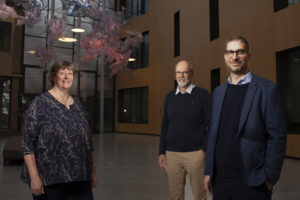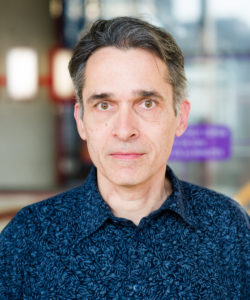Lausanne, 21 February 2023. The Leenaards Foundation will hand out its annual Science Prize, together with over CHF 1.5 million in award money, to three research groups in the Lake Geneva region at a ceremony on 23 March. The research groups are headed by Dr. Sylvain Meylan, who is addressing the problem of antibiotic resistance with a new antibiotic-treatment strategy based on sugar; Dr. Indrit Bègue, who is investigating cerebellar stimulation as a method for alleviating certain symptoms of schizophrenia, such as apathy; and Prof. Julien Vaucher, who is working to better understand the causal link between genetic markers and cardiovascular disease.
The awards ceremony will be open to the public. It will also include a talk by Prof. Alexandre Pouget from the University of Geneva, who will explore the various societal challenges arising from the use of artificial intelligence.
Using sugar to treat post-operative urology infections

“We’re exploring the possibility of using cerebellar stimulation to expand the range of treatment options for the negative symptoms of schizophrenia, such as apathy,” says Dr. Meylan, the chief resident in infectious diseases at Lausanne University Hospital (CHUV). This work is important because up to 40% of patients who are given a urinary probe or catheter go on to develop a severe urinary tract infection.
Dr. Meylan is leading a translational research team including Prof. Beat Roth, the chief physician at the CHUV’s urology department, and Prof. John McKinney, the head of EPFL’s Laboratory of Microbiology and Microtechnology. They’re studying the best way to lure bacteria by administering mannitol in order to “wake them up” and make them more susceptible to antibiotics. “We hope that our new strategy for fighting bacterial infection could one day be used in fields other than urology as well and help mitigate the problem of antibiotic resistance, which is becoming an increasingly worrying public-health issue,” says Dr. Meylan.
➡️ Learn more
Cerebellar stimulation can address the negative symptoms of schizophrenia

Around 85,000 people in Switzerland suffer from schizophrenia. This psychiatric disorder usually manifests as an altered perception of reality and leads to symptoms such as withdrawal and apathy.
“Our research hypothesis is that we can reduce the intensity of these negative symptoms by stimulating the cerebellum, which is located at the back of the brain,” says Dr. Bègue, from the University of Geneva’s Department of Psychiatry and Geneva University Hospital. She’s running this project alongside Prof. Camilla Bellone from the University of Geneva’s Department of Basic Neurosciences and Dr. Jonas Richiardi from the CHUV’s Department of Radiology. The cerebellum contains over 50% of the brain’s neurons and is connected to regions deep within the brain that are associated with our reward system. “The kind of stimulation we’re studying could reactivate the reward systems of patients suffering from schizophrenia, thus helping them recover a more normal level of social interaction,” says Dr. Bègue.
➡️ Learn more
Lausanne residents are helping doctors better understand cardiovascular disease

“Our goal is to better understand the mechanisms that cause someone with no apparent risk factor – like smoking, drinking or high blood pressure – to nevertheless develop cardiovascular disease,” says Prof. Vaucher, who is conducting the research along with Prof. Jacqueline Schoumans, the head of the CHUV’s Cancer Genomics Laboratory, and Prof. Freddy Radtke from EPFL’s School of Life Sciences.
“Some people carrying a specific genetic marker seem more likely to develop an inflammation that could lead to cardiovascular disease,” says Prof. Vaucher. He’s the principal investigator in the CHUV’s CoLaus I PsyCoLaus cohort study, which has been collecting data on a representative sample of Lausanne residents (more than 6,700 volunteers) over the past 20 years. Data from a selection of this cohort are part of what’s being used in this research project to investigate the causal link between genetic markers and cardiovascular disease.
➡️ Learn more

This event is an opportunity to learn more about this year’s three winning research projects and to meet the scientists and experts behind them. Following the awards ceremony, Alexandre Pouget, a professor in computational neuroscience at the University of Geneva, will give a talk titled:
“The link between neuroscience and artificial intelligence, and what artificial intelligence means for society” (talk given in French)
Journalists are invited to attend the event, which is open to the public (registration required), or to follow it live at: leenaards.ch/rdvsciences23.
It will take place at 6pm on Thursday, 23 March, in the AGORA building at the CHUV in Lausanne.
About the Leenaards Science Prize
The Leenaards Prize for Translational Biomedical Research is awarded every year to between one and three research projects that bring together researchers from at least two different universities or teaching hospitals in the Lake Geneva region. Projects are selected because they use cutting-edge research to address a clinical problem in an innovative way. This prize also supports translational research projects that combine fundamental and clinical research in order to transform scientific discoveries into medical treatments.
For more information
Please contact Adrienne Prudente, Head of Communications at the Leenaards Foundation, to arrange interviews with the prize winners, the event speaker or representatives of the Leenaards Foundation.
+41 21 351 25 55
communication@leenaards.ch
Documents for the press: www.leenaards.ch/presse